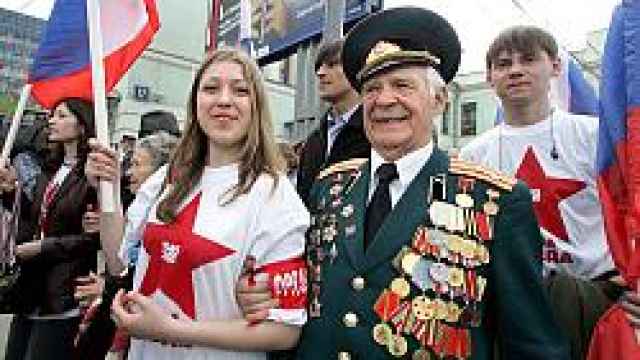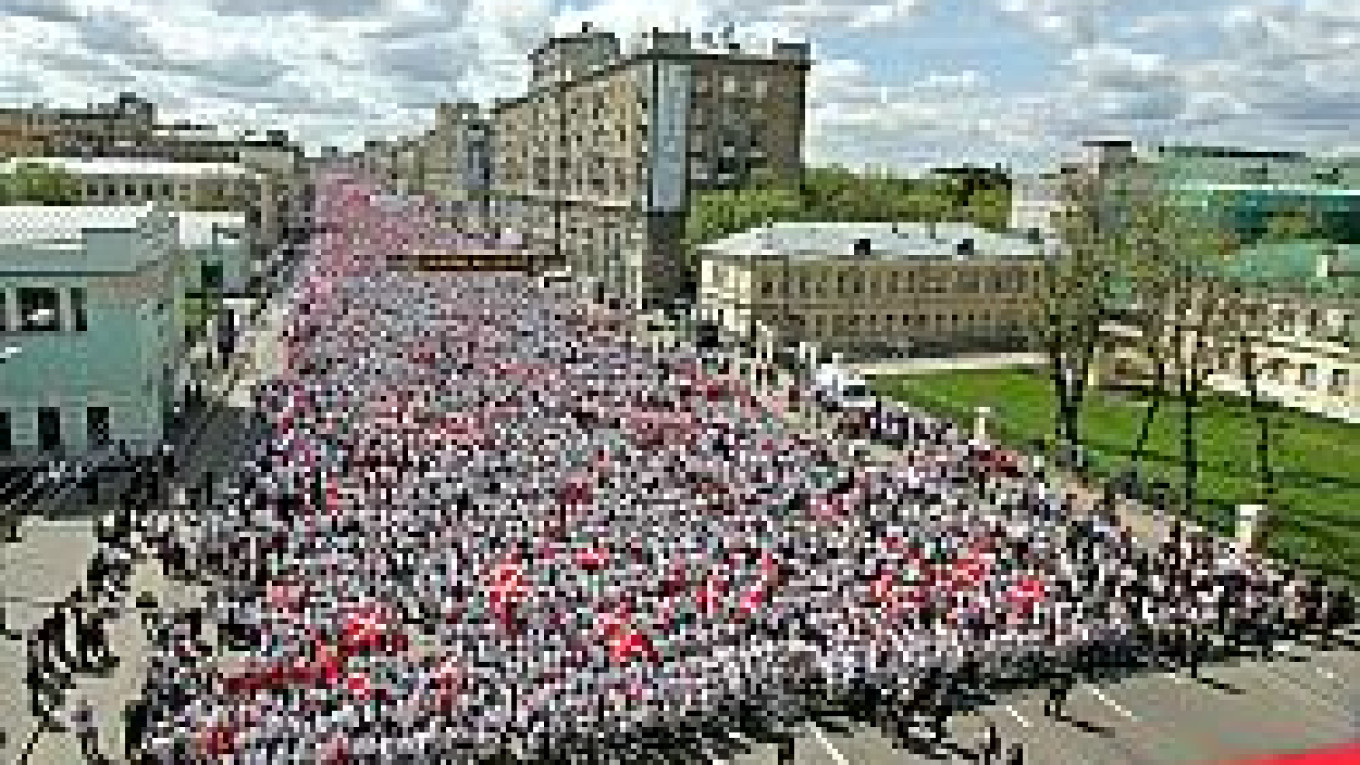More than 50,000 students, many of them brought from a dozen regions by bus and train, took part in the one-hour rally titled "Our Victory" -- a reference to the defeat of Nazi Germany 60 years ago. Patriotic music blared over loudspeakers lining the street, and Nashi leaders gave speeches paying tribute to World War II veterans, hundreds of whom were in attendance.
Nashi, or Us, is seen in some circles as part of a Kremlin effort to help ensure a smooth transfer of power to President Vladimir Putin's successor in 2008. Although Nashi only held its founding congress on April 15, it has already made a name for itself with its aggressive rhetoric against the stock bogeymen of nationalist politicians: oligarchs, liberals, fascists and Western governments.
Political attacks, however, took a back seat Sunday to triumphant patriotism that echoed last week's Soviet-style celebration on Red Square of the 60th anniversary of Victory Day.
Speakers on a stage erected near 10 Leninsky Prospekt led cries of "hurrah!" for the "veteran heroes," and veterans decorated students with pendants resembling war-era bullet cases attached to necklaces made from tricolor twine. The words "Remember the war, protect your Motherland" were engraved on the pendants.
"We will take the baton in the battle for the independence of our Motherland," Nashi leader Vasily Yakemenko told the crowd, in a nod to the pendants. "We will never hand our country over to anyone."
The students swore a symbolic oath to remember Russia's victory and remain patriots.
From an organizational standpoint, the rally was an impressive spectacle. From high atop a cherry picker near the stage, Leninsky Prospekt was a sea of white T-shirts, red-and-white Nashi flags and national flags for as far as the eye could see.
Many participants said they were recruited to attend by Nashi leaders, known as commissars, at regional institutes and universities.
Vladimir Zyuganov, a 19-year-old student from Bryansk, said he was one of around 4,000 students who arrived in 50 buses from the city.
"It was incredible," Zyuganov said after the rally. "I didn't expect so many people to be here."
Zyuganov said his group had arrived Sunday morning and would leave in the evening, and that he was not sure if they were going to get a tour of the city, as they had been promised.
For the most part, the students were quick to praise the war veterans. "Without their victory, we would not be here," said Natasha, 17, a student from Nizhny Novgorod who refused to give her last name.
She said she had arrived with 4,000 students on four trains from Nizhny Novgorod.
Several students refused to talk with a reporter. A young woman told NTV television that she had been told not to speak with journalists.
It is not difficult to round up young people from the regions to come to Moscow for such events, political analyst Vladimir Pribylovsky said. "You don't have to pay them," Pribylovsky said. "Usually, if you offer a free trip to Moscow, they'll come for sure. It's May, and the weather is nice."
The sheer number of participants at Sunday's rally far eclipsed anything ever organized by Moving Together, the pro-Putin youth organization that Nashi is apparently replacing. Nashi leader Yakemenko formerly led Moving Together.
 Vladimir Filonov / MT A World War II veteran walking with a young woman wearing a white Nashi T-shirt at the one-hour rally on Sunday. | |
The biggest rally organized by Moving Together was shortly after its founding in 2001, when it gathered about 11,000 young people near Red Square in a show of support for Putin.
Pribylovsky noted that the money for transportation costs was not taken from government coffers but rather from "donations" from regional businessmen. "Typically they'll call a local businessman and say, 'If you want to get in good with the government, pay for some tickets to Moscow,'" he said. "No businessman will decline. So it's just a matter of making enough phone calls."
Political analysts have speculated that the Kremlin might use Nashi to highlight a purported threat of radical nationalism ahead of the 2008 presidential election and ensure that Putin's chosen successor is elected. Nashi was reportedly created by Putin's deputy chief of staff and political mastermind Vladislav Surkov.
Yakemenko has declared Nashi to be an "anti-fascist" movement and a "healthy reaction" to the ultranationalist National Bolshevik Party, which is growing in popularity among young people. Yakemenko has accused liberal opposition politicians, the liberal Committee-2008 movement, self-exiled businessman Boris Berezovsky and Communist lawmaker Albert Makashov, who is notorious for his anti-Semitic remarks, of "gathering under Nazi banners."
In its short existence, Nashi has already had run-ins with other youth groups. Ilya Yashin, leader of the liberal Young Yabloko group, said he and Kommersant reporter Oleg Kashin were attacked by Nashi members after attending a Feb. 26 meeting of the group in Solnechnogorsk, north of Moscow, to see firsthand what Nashi was about.
Shortly before Sunday's rally, 22 members of the leftist Red Youth Vanguard were detained by police near the Leninsky Prospekt metro station for trying to disrupt the gathering, Interfax reported. Police confiscated a sign reading "Nazism Won't Fly," Interfax said.
More than 1,800 city policemen and 7,500 Interior Ministry troops were on duty at the rally, Interfax reported.
Residents of apartment buildings on Leninsky Prospekt complained they could not reach their homes. Ekho Moskvy radio said some people had problems getting to a nearby hospital.
The rally ended with the Russian national anthem, the lyrics of which were printed on the back of the white T-shirts worn by virtually all of the participants. On the front was a large red star with the words "Our Victory."
A Message from The Moscow Times:
Dear readers,
We are facing unprecedented challenges. Russia's Prosecutor General's Office has designated The Moscow Times as an "undesirable" organization, criminalizing our work and putting our staff at risk of prosecution. This follows our earlier unjust labeling as a "foreign agent."
These actions are direct attempts to silence independent journalism in Russia. The authorities claim our work "discredits the decisions of the Russian leadership." We see things differently: we strive to provide accurate, unbiased reporting on Russia.
We, the journalists of The Moscow Times, refuse to be silenced. But to continue our work, we need your help.
Your support, no matter how small, makes a world of difference. If you can, please support us monthly starting from just $2. It's quick to set up, and every contribution makes a significant impact.
By supporting The Moscow Times, you're defending open, independent journalism in the face of repression. Thank you for standing with us.
Remind me later.


